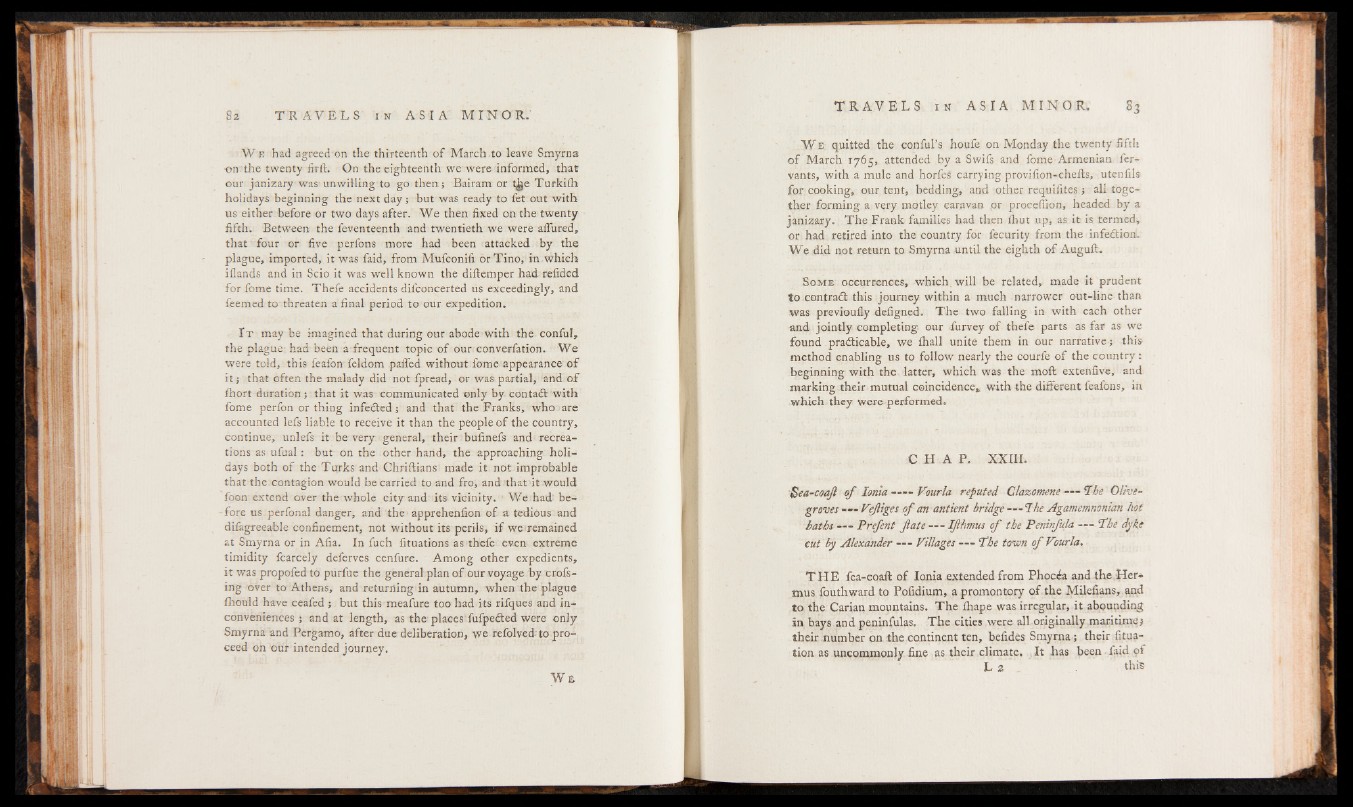
W e had agreed-on the thirteenth of March to leave Smyrna
on the twenty firft. On the eighteenth we were informed, that
our janizary was-unwilling to go then; Bairam or t^e Turkifh
holidays beginning the next day; but was ready to fet out with
us either before or two days after. We then fixed on the twenty
fifth. Between the feventeenth and twentieth we were allured,
that four or five perfons more had been attacked by the
plague, imported, it was faid, from Mufconifi orTino, in.which
iflands and in Scio it was well known the diftemper had refided
for fome time. Thefe accidents dil'concerted us exceedingly, and
feemed to threaten a final period to our expedition.
I t may be imagined that during our abode with the conful,
the plague-had been a frequent topic of our converfation. We
were told, this feafon feldom palled without fome appearance of
i t ; that often the malady did not fpread, or was partial, and of
Ihort duration; that it was communicated only by contadt with
fome perfon or thing infedted; and that the Franks, who are
accounted lefs liable to receive it than the people of the country,
continue, unlefs it be very general, their bufinefs and recreations
as ufual: but on the other hand, the approaching holidays
both of the Turks and Chriftians made it not improbable
that the.contagion would be carried to and fro, and that it would
foon extend over the whole city and its vicinity, i We had before
us perfonal danger, and the> apprehenfion of a tedious and
difagreeable confinement, not without its perils, if weiremained
at Smyrna or in Alia. In fuch fituations as thefe even extreme
timidity fcarcely deferves cenfure. Among other expedients,
it was propofed to purfue the general plan o f our voyage by crofs-
ing over to Athens, and returning in autumn, when the plague
Ihould have ceafed ; but this meafure too had its rifques and inconveniences
; and at length, as the places fufpedted were only
Smyrna and Pergamo, after due deliberation, we refolved-to proceed
on oui intended journey.
Wt
W e quitted the conful’s houfe on Monday the twenty fifth
o f March 1763, attended by a Swifs and fome Armenian fer-
vants, with a mule and horfes carrying provifion-chelts, utenfils
for cooking, our tent, bedding, and other requifites ; all together
forming a very motley caravan or proceffion, headed by a
janizary. The Frank families had then ihut up, as it is termed,
or had retired into the country for fecurity from the infection.
We did not return to Smyrna until the eighth of Auguft.
Some occurrences, which, will be related, made it prudent
to contract this journey within a much narrower out-line than
was previoufly defigned. The two falling in with each other
and jointly completing our Purvey of thefe parts as far as we
found practicable, we {hall unite them in our narrative; this
method enabling us to follow nearly the courfe of the country:
beginning with the latter, which was the moft extenfive, and.
marking their mutual coincidence, with the different feafons, in
which they were performed.
C H A P . XXIII.
Sea-coaji of Ionia —— Vourla refuted Glazomene — The Olive-
groves — Vejliges o f an antient bridge — I he Agamemnonian hot
baths — Prefent Jlate — Ifihmus o f the Peninfula — Phe dyke
cut by Alexander —- Villages — Phe town of Vourla.
T H E fea-eoaft of Ionia extended from Phocda and the Her*
mus fouthward to Pofidium, a promontory of the Milefians, and
to the Carian mountains. The fhape was irregular, it abounding
in bays and peninfulas. The cities were all originally maritime;
their number on the continent ten, befides Smyrna; their, fitua-
tion as uncommonly fine as their climate. It has been • faid qf
L 2 . this